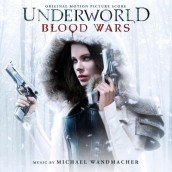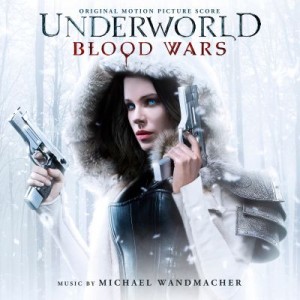
UNDERWORLD: BLOOD WARS soundtrack | ©2017 Lakeshore Records
Masked maniacs, ferocious fish, unhinged vigilantes and a wheelman from hell. Reading a list of Michael Wandmacher’s prolific credits feels like a particularly crazed membership drive for The Suicide Squad, a rogue’s gallery that he’s taken out for a spin with a distinctively energetic ability for pounding action where a metal attitude often hits the pedal. Starting his career in the rhythmic company of Jackie Chan with the English version scores for ARMOR OF GOD, TWIN DRAGONS and ONCE A COP. Wandmacher has brought his passion to CRY_ WOLF, THE KILLING FLOOR, MY BLOODY VALENTINE, PIRANHA 3-D, THE LAST EXORCISM:PART II and PUNISHER: WAR ZONE (though with equally pleasant variation for the likes of MAX KEEBLES’ BIG MOVE, BEN 10: ALIEN SWARM and THE GOLDBERGS).
It seems only natural that given the karate-proficient composer’s genre action chops that werewolves and gun-shooting vampires would be ideal to take a bow in Wandmacher’s company. Now it’s a hybrid of both monsters for the long-running UNDERWORLD series with BLOOD WARS, an eternal battle between Lycan and vampire that found a darkly beautiful “death dealer” in Selene (Kate Beckinsdale). Over the course of three films (and a Selene-less prequel), the heroine has done her best to ensure her clan’s dominance over the Lycans, a fight that now spawns an all-powerful werewolf clan whose final push for dominance puts Selene to her ultimate test on their frozen home turf.
Though plenty of cinematic kills are notched into Wandmacher’s scoring belt, the composer finds himself a newbie for his biggest genre credit yet for UNDERWORLD: BLOOD WARS – the series’ ground impressively trod by Paul Haslinger and Marco Beltrami. Wandmacher takes up their bloodline using darkly heroic, pounding orchestra rhythms that drive the relentless Selene. Howling winds strike for werewolves as eerie ethnic instruments recount the two sides’ forever war. It’s work that fits into UNDERWORLD‘s musical groundwork as it resounds with sinister heritage and modern, pulsing action that significantly amps up Selene’s dramatic stakes; More so, this UNDERWORLD score howls to the blood moon for a composer who energetically goes for the throat with musical guns blazing – twin fusillades for the supernatural and action cinema that excitingly mesh for what might be a vampiress’ swan song.
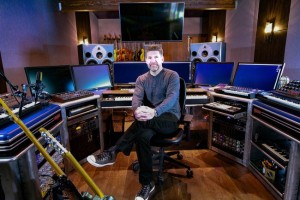
UNDERWORLD: BLOOD WARS composer Michael Wandmacher| ©2017 Michael Wandmacher
ASSIGNMENT X: Could you tell us what brought you into film composing?
MICHAEL WANDMACHER: It was something I aspired to early on, but being in Minnesota at the time, I wasn’t quite sure how to get there. Some music community connections eventually got me started working on TV spots and news music full time. Through these jobs I was able to meet filmmakers in Minneapolis who were doing both shorts and features, some of which I scored. That’s when a completely unreal event occurred. Through a series of email exchanges that started via a film music newsgroup (Yes, newsgroup. Way back in the Jurassic period of the internet!) I met Alan Silvestri, who already was a musical hero to me and is even more so now. He subsequently invited me to LA to see some real scoring sessions and introduced me to a number of people, including YOU, the interviewer, who eventually paved a path for me to move to LA permanently. Just those few trips got my music circulated enough to start working on direct-to-video films for Dimension and also land a job scoring MODERN VAMPIRES for Richard Elfman, Danny’s brother. Between the two of them, they picked me to do the film! And I was in Minnesota! At that point, there was a resounding chorus around me saying, “If you really want to do this, you have to move.” So I did the classic “throw-everything-in-a-U-Haul and off to the land of movie magic!” To this day, when I truly think of how all that unfolded, especially with the hindsight of knowing just how difficult it is to make a career of scoring, I feel incredibly fortunate.
AX: Having worked with Lexi Alexander on the insane PUNISHER: WAR ZONE, how did the experience compare with Anna Foerster on BLOOD WARS? And what do you think these movies show when it comes to women as being as capable of bloody kick-ass action as male directors are?
WANDMACHER: I don’t draw comparisons between directors. To me, they are all fascinating people who take on an incredibly demanding task. Each one has their own vision, work methodology and creative process. A big part of what makes my job interesting is adapting and responding to each individual director and what their needs are for a given film. Whether they are male or female makes no difference to me. I am solely focused on the collaboration and delivering the score that’s best for their film and hopefully forging a working relationship that continues into the future.
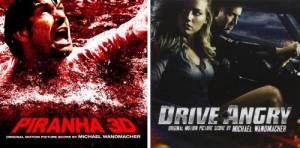
PIRANHA 3-D and DRIVE ANGRY soundtracks | ©2017 Lakeshore Records
AX: What do you think made you particularly adept at particularly ferocious genre scoring for such projects as PIRANHA, DRIVE ANGRY, MY BLOODY VALENTINE and BLOODBORNE?
WANDMACHER: After years of playing guitar in rock bands, it seemed natural to me to try to inject that sort of energy into film scores. The metalhead part of me is still alive and well and it helps me formulate high-powered musical passages into something that an orchestra will embrace. For instance, I often work out rhythmic figures for a bass string section on an actual bass guitar. Or I come at it the opposite way and use the legato flow of the celli to guide a moving guitar atmosphere or texture. For these types of projects, the ability to think in terms of symphonic music as it relates to rock or metal or industrial music and also how the two can combine into something even bigger and more aggressive is a great deal of fun! I’ve been experimenting with this sort of intermingling and crossover since the beginning of my career, even before the approach was popularized.
AX: Was the UNDERWORLD franchise on your radar as a fan? And how did you become part of BLOOD WARS?
WANDMACHER: Definitely. The idea that a centuries-long battle between the two factions of our folkloric super monsters is waging right alongside, but relatively unknown to, humanity is very cool. And both sides deal with the same sorts of power struggles, corruption, forbidden alliances and emotional discord that humans do. It’s a very interesting, fresh twist on myths and legends that have lived inside a certain box of tricks for a long time.
As for how the job came my way, it was pretty serendipitous. I had worked on PATIENT ZERO for Screen Gems and they were very happy with the results. When the time came to find a composer for BLOOD WARS, I expressed my interest in doing the film. It represented a dream project for me. The confidence I had built with the studio on PATIENT ZERO led them to facilitate a series of meetings, which eventually led to getting the job. I was ecstatic.
AX: As this is your first entry into the UNDERWORLD series, how did you bone up on the series, particularly when it came to capturing the musical vibe of the franchise?
WANDMACHER: As a fan, I understood the UNDERWORLD universe and its components going into the job. Although I knew the score would be incredibly challenging, I was confident that I could find the place that the music needed to be in for this particular film. After some discussions about the tone and shape of the score, I started building custom templates of sounds, thematic ideas and rhythmic pulses that I thought were appropriate. That’s what I call “mad scientist mode”. In that space of time, I don’t limit myself. It’s pure experimentation and always yields elements that will make the score unique. In the case of this film, I started with some single scenes, trying different combinations of instruments and sounds, and filled out the rest from there. The process of refining the all the programming, recording myself playing various instruments and orchestration continued all the way up to recording.
AX: How did you want to put your own personal mark on the UNDERWORLD music?
WANDMACHER: It was certainly a daunting to enter into a beloved franchise and want to add my spin to it – while, at the same time not stepping on the toes of what came before me! I was very aware that I was contributing to a larger whole, but that BLOOD WARS had to have a distinct musical personality. The themes, motifs, ideas and sounds in the score are all new, but they still had to latch into the overall UNDERWORLD universe in way that wouldn’t throw off audiences. The key for me came from the fact that the story swirls around Lycan/Vampire hybrids, both existing and those characters that are attempting to achieve hybridization. I let that narrative point spill over into the music and built a palette that was hybrid on a grand scale, utilizing both a very large orchestra and hundreds of tracks of electronics. The two sonic sides of the score push and pull and combine right along with the plot as it unfolds. How I mixed all these elements up compositionally allowed my own voice to emerge in the music.
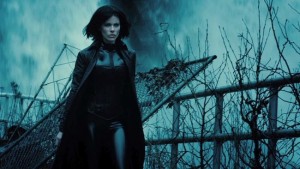
UNDERWORLD: BLOOD WARS| ©2017 Lakeshore Entertainment
AX: How do you musically see the character of Selene, especially when it comes to the new abilities she gains?
WANDMACHER: She is the thematic, emotional and stylistic core of the film. The best metaphor I can muster right now is that if the movie is a solar system, she is the sun. Even if other themes or elements arise in the score when she is not onscreen, they still tie back into her character somehow. Over and over, I would always look to her character for inspiration while working on the film to find a fresh angle for new sequences or narrative twists. A great deal of the momentum in the film is derived from her performance or the performances of others as they seek to interact with her somehow. She was a musical well to constantly draw from. As for how the music relates to the new abilities she gains, it also ties directly into new motifs and colors as they become appropriate.
AX: Is it particularly hard bringing emotion to a character whose survival depends on being a stone-cold killing machine?
WANDMACHER: I don’t think so. While everyone loves watching her battle onscreen, I’ve always recognized Selene as the reluctant warrior queen-type, not the merciless conqueror-type. She fights when she has to, but never for the sport of it. The key word you use in the question is “survival”. That’s why she does what she does. There is nothing nefarious at work, even when she’s clearing a room. Action has a purpose. She is actually awash in emotion through all of the films she appears in and in a constant state of internal conflict. Emotional pain and longing are what drives her at her core and she seeks to do what she feels is right, even when it appears counter to her kind’s existence. Ultimately, she seeks peace, but it constantly eludes her. I believe these things are what make her most compelling to audiences. Ironically, even though undead, there is humanity in her. Drawing from that construct, I see making the music that surrounds her introspective and emotional moments as being part of her true essence.
AX: Did you want to musically differentiate the Lycans and Vampires?
WANDMACHER: In a broad sense, yes. But I was more concerned with maintaining a presence of this whole universe of beings that exist among us. The music palette, as a sum, is what acts as the backdrop for that world. In terms of differentiation, the vampires are often underscored with dark, gothic string movements and a heightened sense of drama and intrigue to highlight their old-school hierarchical ways and in-fighting, while the Lycan underscore, especially under the leadership of Marius, takes on a distinctly militaristic tone. He is a general leading his troops to battle. Most important was a feeling of propulsion and forward motion, to give the sense that these two factions are headed for a climactic showdown on a scale that neither side has ever seen.
AX: This is definitely one of the icier UNDERWORLD movies. How did the setting inform the score? And could you talk about making particularly cool use of eerie, ethnic winds as well as voices?
WANDMACHER: BLOOD WARS introduces us to The Nordic Coven. It is a fortress set far to the north and houses a whole different breed of vampire. The coven is old (and cold!), sequestered and its inhabitants are steeped in lore, ritual, and a monastic-type existence. Finding the music for this locale and population was probably the biggest musical challenge in the entire movie. We (the director, producers and myself) all knew we wanted something that both spoke to being Nordic and fit within the UNDERWORLD sound, but we weren’t sure was that was at first. For battle scenes it was relatively straightforward as primitive war drums and war horns were utilized alongside the orchestra, but the dramatic scenes were a different nut to crack.
After researching and experimenting with various traditional Nordic and Scandinavian instruments, I found that they weren’t quite fitting into the fabric of the score. Many of the instruments, like the nyckelharpa, hardanger fiddle, kantele, or various dulcimers and zithers didn’t convey the mysterious, dangerous and exotic feeling that the director was looking for. The solution lay in another instrument: the flute, of which there are many varieties throughout the whole of Northern Europe. By mixing and manipulating different flute types down into registers that are un-naturally (or supernaturally?) low, I landed on a sound that was unique to the coven in terms of mood and character. It is the undead’s brand of Nordic winds – dark, airy and evocative, with deep vibrato and strange overtones. Vocal chanting is layered with these flutes to heighten the ritualistic nature of these vampires. In addition, I added bowed crotales playing intentional dissonance against the melodic elements, and various bells and ceremonial percussion, like frame drums, zills, and chains.

UNDERWORLD: BLOOD WARS| ©2017 Lakeshore Entertainment
AX: There’s also the striking use of metallic effects in the score. What made you go for an industrial sheen of sorts, yet one that never makes the jump into that full-on territory?
WANDMACHER: Mainly, I like using those types of sounds to add aggressiveness to the music. They have an edge to them that slices through a cue, no matter how dense the orchestration or layering, that provides harsh definition and rhythmic clarity that you can’t find with other types of sounds. They are the fangs and claws and teeth in the music. As effects and ambiences, metallic textures call forth a danger and ferocity that warns the audience that unexpected events, unforeseen threats or a sudden bloody outburst could happen at any time, even in moments where everything seems calm.
Going all the way back to my TV commercial days, I’ve always been fascinated with sound design and how that can integrate with score. The use of metallics and other non-traditional or organically sourced sounds is always a consideration to further enrich the textures in the music. For instance, some people see might see a box of nails sitting the garage. I see an instrument! That idea of music design, as people are calling it now, is always something I try to bring to a score that utilizes ambiences and moody atmospheres like the ones in “Blood Wars.”
AX: People may not realize you create much lighter fare for THE GOLDBERGS and the upcoming IMAGINARY MARY. Is it difficult shape-shifting into a whole different composing mode, and do you try to mix up your projects when possible?
WANDMACHER: I get asked the “shift” question a lot and the answer is, truthfully, no. I think it’s because of my entertainment input as a kid. It was pretty eclectic. Cartoons, genre films of all kinds, classic films, TV shows (especially comedies I watched with my dad), video games, comic books, whatever records came along, novels, etc. No one thing in particular. I was always paying attention to the music or making it up in my head if I was reading something. I carried that mental kaleidoscope of stuff with me into adulthood and use it set my mind in motion when approaching any type of score. I think a lot of composers can do the same. We’re a much more creatively flexible lot than people might think!
I like to mix things up because it keeps work challenging and interesting and opens up doors to new relationships that can lead to future work that may stretch your creative boundaries even further. And those varied relationships are the key to keeping things fresh. It’s a tough thing to do, though, because if you find success in a particular genre, you can get pigeonholed very fast within the industry and that can cause a career to stagnate. For that reason, I’m very grateful that I can work on projects across genres. In looking at the careers of people I respect and admire the most, they all have resumes that span many musical styles and approaches.
AX: Tell us about your score for the unusual “zombie talker” pandemic movie PATIENT ZERO that will be hitting in February?
WANDMACHER: I can’t say much about that yet. It would actually give too much away! Only that it’s not what you would expect for a movie of this type. The atypical approach is what made the project so interesting.
AX: Given the amount of savagery you score, do you think movies are going to get even darker now, and their scores along with them?
WANDMACHER: Not necessarily. It’s all about filmmakers and musical trends in the marketplace. A good scary movie will always have an audience, as will a fun animated film. People are always looking for a variety of different things, especially in this internet-driven age of the short attention span. If everything moved towards being progressively darker, my guess is that the moviegoing public would eventually tire of it and look for something light. The converse is probably, true, too. So, it leads to a kind of equilibrium. People expect a movie like BLOOD WARS to be dark and stylish and aggressive, but not so for latest comedy or drama.
AX: Are you Team Lycan, or Team Vampire?
WANDMACHER: I’m Team Selene. So, given she’s a hybrid, I guess that makes me a bit of both.
Get Michael Wandmacher’s score for UNDERWORLD: BLOOD WARS on Lakeshore Records HERE
Follow us on Twitter at ASSIGNMENT X
Like us on Facebook at ASSIGNMENT X
Article Source: Assignment X
Article: Interview with UNDERWORLD: BLOOD WARS composer Michael Wandmacher
Related Posts:




